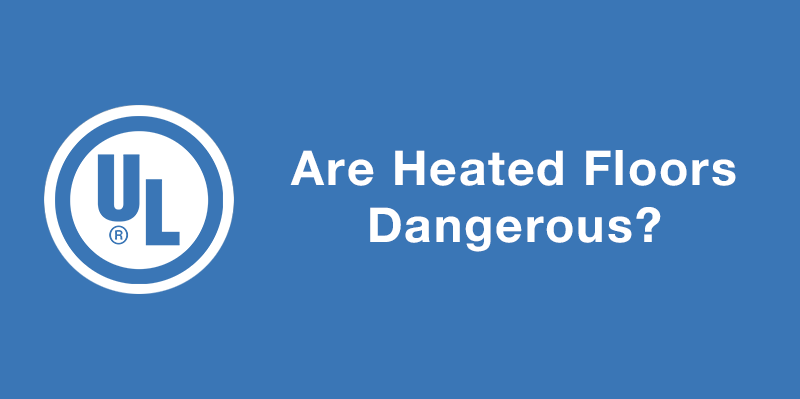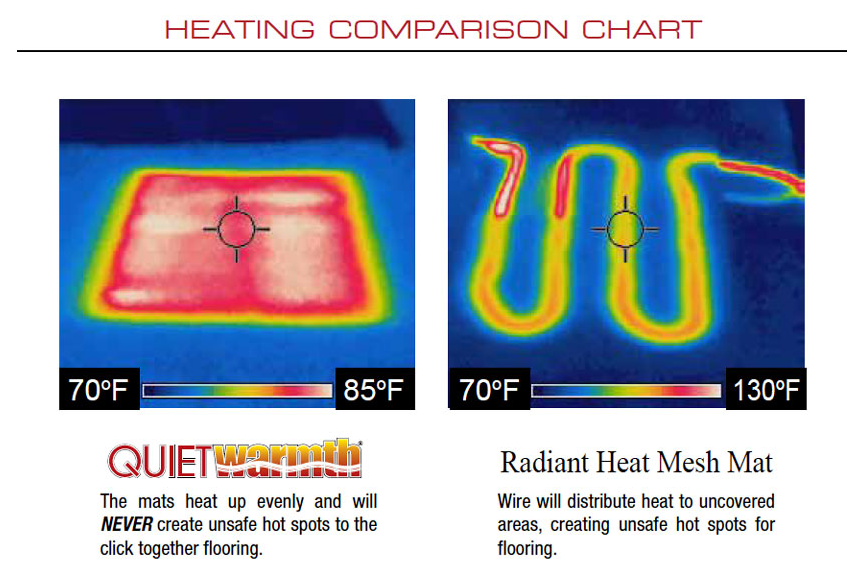Are Heated Floors Dangerous?

Floor Heating has grown in popularity over the last two decades. This growth has derived from improvements in floor heating like improved safety, efficiency, pricing, and ease of installation. Many systems are often installed in kitchens and bathrooms, where water and electric floor mats could be a dangerous combination. This ushers the question “are heated floors dangerous?” We cannot speak for all electric floor heating manufacturers, but in our case yes, QuietWarmth electric radiant heating systems are safe. QuietWarmth is UL listed, ETL listed, and offers a 25 year warranty all to help ensure the safety of our products.
Will Heated Floors Shock Me?
The odds of the heated floors shocking you are little to none. Our entire heating systems went through a thorough research and development process to ensure we are providing the safest product for our customers. QuietWarmth’s wires are surrounded by a durable sheath. Preventing any current leakage from reaching the floor. The systems have been UL and ETL approved meaning both the wires, and the conductive heat mats meet the national safety standards. Since the conductive ink mats are thinner than a credit card, you don’t have to worry about them raising your floor. Your flooring will not affect the mats negatively either.
Will Heated Floors get too Hot?
If radiant floor heating becomes too hot, it has been known to damage flooring and become uncomfortable to live on. We specifically engineered QuietWarmth to not exceed 85 degrees F. This way it is incapable of reaching a potentially dangerous temperature. Since QuietWarmth uses conductive ink technology, the heat is evenly distributed. Systems that use electrical wires running through mesh mats are more prone to leaving hot and cold spots.

Can Heated Floors Short Circuit?
In a worst case scenario, if the system becomes damaged, would it pose a risk of a short circuit of the system? No, QuietWarmth thermostats have a built-in ground fault circuit interrupter (GFCI), that will automatically cut-off power if a breach is detected. National electric code requires electric radiant floor heating systems to be protected by a GFCI. The thermostats also come with a 10′ long floor sensor that allows the thermostat to accurately control the temperature of the floor.
Heated Floors are Better for Allergies
Radiant heating does not only give improved comfort, but also improves air quality when compared to other floor heating systems. The mats heat the floor, which then heat up people and objects in the room. Heat given off by the warmed floor gets evenly distributed throughout the room preventing drafts and cold spots. Traditional HVAC systems blow air around the house increasing the movement of dust. Extra dust in the air can be hindering for people with allergies and make breathing more difficult. Conventional systems also reduce the humidity of the room, making the air dry and uncomfortable. Considering all of these reasons, underfloor heating is the go to system for allergy suffers.
Floors Compatible with QuietWarmth
You have chose your flooring and have decided to install radiant heat with them. Ultimately, it is best to find your flooring manufacturers installation instructions. They will state if radiant floor heating can be used, and give certain requirements the radiant heating must fall under if radiant heating is allowed. Below is a list of common flooring manufacturers QuietWarmth has been known to work with. Each brand has many different types of flooring, so it is still important to check the installation guide for the specific flooring you are looking at. If you don’t see your brand of flooring in the list below, don’t worry, QuietWarmth fits most floors requirements.
- LifeProof
- Pergo
- Hardwood
- Mannington
- Shaw
- Mohawk
- Tarkett
- Lumber Liquidators
- etc…
Join Our Newsletter
You are about to install your new flooring. As you lay the first plank you realize that
